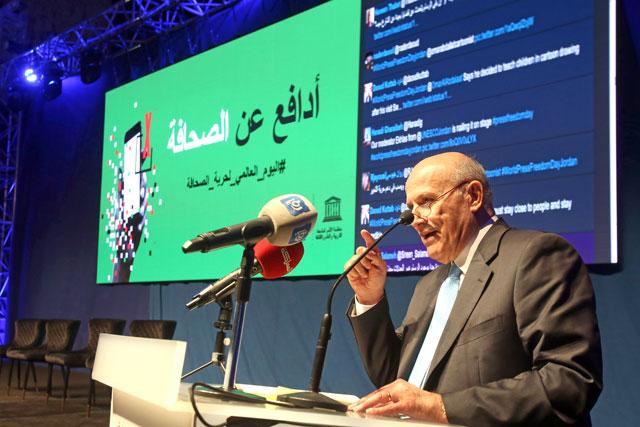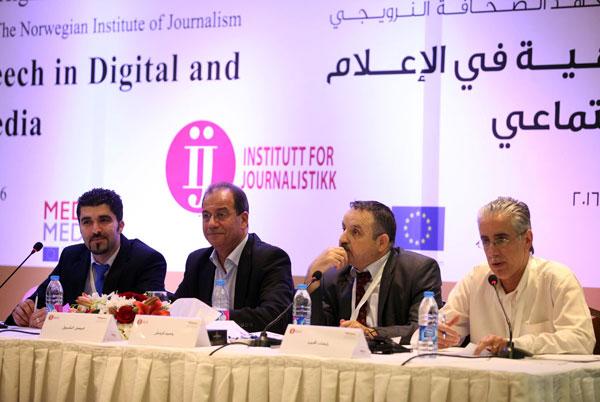You are here
Free press basis of participatory democracy, tool to hold governments accountable — Fontana
By Dana Al Emam - May 07,2017 - Last updated at May 07,2017
AMMAN — World Press Freedom Day, held annually on May 3, is an occasion to examine how journalism can contribute to peace, while also being more pluralistic and development-oriented, professionals and stakeholders agreed on Sunday.
Held under the theme “Critical Minds for Critical Times: Media’s role in advancing peaceful, just and inclusive societies”, this year’s event marks the international occasion to highlight the role of free and professional journalism in promoting inclusiveness and countering hate speech.
The event, organised by UNESCO’s Amman office together with the organisations’ offices in Doha and Ramallah, was held under the patronage of HRH Princess Rym Ali.
Speaking at the event, Mohammad Qutaishat, director general of the Jordan Media Commission, said the focus on promoting professionalism through enhancing technical and legal capacities of journalists and media practitioners creates a set of professional ethics that cannot be “politicised”.
He said the “pioneering Jordanian experience in this regard was not easy”, elaborating that regulatory bodies invest in the freedom of the press by enhancing it so that the journalistic body itself drives out “deviation” within the profession.
In this regard, press institutions bear the responsibility for honing the capacities of their members in a manner that enables them to consolidate freedom of expression with the general good, he noted at that the event held at the Royal Film Commission.
“Investing in the freedom of the press has enabled us to reap the rewards,” Quteishat said, who added that professional media have contributed to Jordan’s “safe” passage through external crises, as well as aiding the fight against hate speech and violence and contributing to the promotion of the culture of governance and accountability.
For his part, UN Resident and Humanitarian Coordinator in Jordan Andres Pedersen drew a direct connection between freedom of the press and the implementation of the internationally recognised Sustainable Development Goals (SDGs).
“On this day, let us reaffirm our commitment to work in a concerted and effective manner towards contributing to sustainable development, and achieving all SDGs,” he said, adding that a free press facilitates the public’s right to access to information.
EU Ambassador to Jordan Andrea Matteo Fontana highlighted the need for further cooperation among all stakeholders concerned with advancing the freedom of independent, quality and ethical journalism.
“By supporting the digitisation free flow of quality and well-researched information on matters of public interests, and by acting as the public’s watchdog, independent media are the basis of a participatory democracy and a tool to make governments accountable for their actions,” he noted.
The event included a panel discussion on how media can contribute to peace, dialogue and sustainable development, and another panel on the balance of legal and non-legal measures to be applied when countering hate speech.
Jordan’s press freedom ranking dropped by three places in 2016 compared to 2015, according to the World Press Freedom Index
The index, published by Reporters Without Borders recently, indicated that Jordan’s ranking in 2016 dropped to 138th place compared to 135th place in 2015.
“Jordan’s media take care to observe the limitations set by the authorities. The authorities have stepped up control, especially over the Internet, since 2012, when the press and publications law was overhauled,” the index indicated.
Related Articles
AMMAN — The Jordan Press Foundation (JPF) — Al Rai on Wednesday hosted the UNESCO celebration of the World Press Freedom Day (WPFD) 2019, on
AMMAN — Politicians and unprofessional media outlets play a major role in spreading hate speech, which is being witnessed across the world,
AMMAN — The Jordan Press Foundation (JPF) — Al Rai on May 15 will host the official celebration for UNESCO’s World Press Freedom Day 2019.Th


















